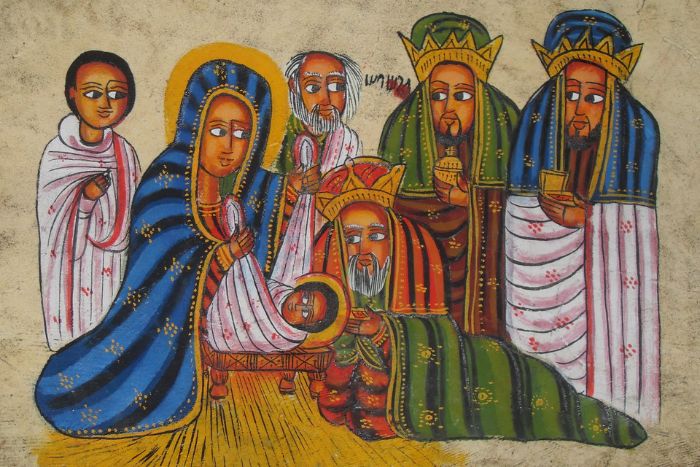Genna (Ethiopian Orthodox Christmas) – January 7
Overview:
Date of Celebration: January 7th (according to the Ethiopian Orthodox Tewahedo Church calendar, which follows the Julian calendar). Genna is the Ethiopian Orthodox celebration of the birth of Jesus Christ. It is one of the most important religious holidays in Ethiopia, marking the nativity of Christ. The celebration occurs in the midwinter, which is considered a time of renewal and divine light.

Historical Context:
Genna is based on the biblical account of the birth of Jesus Christ in Bethlehem, as recorded in the Gospels of Matthew and Luke. However, the Ethiopian Orthodox Church celebrates Christmas on January 7th, which is 13 days later than the Western Christian tradition of December 25th. This difference in date arises from the use of the Julian calendar rather than the Gregorian calendar in the Ethiopian Church. The name "Genna" is derived from the Ge'ez language (the ancient liturgical language of Ethiopia) and refers both to the birth of Christ and to the celebration itself.
Cultural and Religious Practices:
- Church Services and Prayers:
On Genna, Ethiopian Orthodox Christians attend midnight church services, which are rich in prayer, hymns, and scripture readings. The services begin late in the evening and continue into the early hours of the morning, symbolizing the night of Christ’s birth. The church services emphasize the incarnation of Christ—God becoming human to save humanity. Priests and deacons lead the congregation in special hymns (known as "Qeddase") and Gospel readings focusing on the birth of Christ and the announcement to the shepherds. During the service, the altar is specially decorated, and an Ethiopian Orthodox cross is often displayed, symbolizing Christ’s sacrificial life and victory over sin and death.
- The Great Fast (Advent) and Feasting:
The period leading up to Genna is marked by a 40‑day fast known as Tsome Genna or the Advent Fast. During this fast, adherents abstain from eating animal products and focus on spiritual reflection, repentance, and preparation for the celebration of Christ's birth. After attending the midnight mass, people break their fast with a feast that includes traditional Ethiopian foods such as Doro Wat, Injera (flatbread), and sweet treats like Atayef. This meal expresses joy and gratitude for the gift of Christ’s birth, and serves as a time for family reunions and community bonding.
- Lighting Candles and Processions:
During Genna, candles are lit in homes and churches, symbolizing the Light of the World—Jesus Christ. In many communities, people participate in processions around churches or in public spaces, carrying candles and singing traditional hymns. This act reflects the belief that Christ’s light dispels darkness and reaches every believer.
- Traditional Genna Game:
A unique aspect of the Genna celebration is a traditional game called Genna, similar to field hockey. Played primarily by men and boys, participants use a wooden stick (the Gena) to hit a ball. While this game has no direct religious symbolism, it has become part of the cultural festivity and symbolizes unity, community spirit, and the joy reminiscent of the shepherds’ delight upon hearing the news of Christ’s birth.
- Generosity and Charity:
Genna is also a time for generosity and sharing. Many Ethiopians, especially in rural areas, distribute gifts—such as food, clothing, or money—to the poor and needy, echoing the humble beginnings of Jesus’ birth in a manger. This practice emphasizes the values of compassion and kindness that are integral to the holiday.
- Ethiopian Christmas Foods:
The holiday meal is central to the Genna celebration. Doro Wat, a spicy chicken stew, is traditionally served with Injera. Additional festive treats such as Atayef and Baklava are enjoyed, and in urban areas, various baked goods and cakes are exchanged among friends and neighbors to further the spirit of sharing.
- Family and Community Celebrations:
Genna is not only a religious occasion but also a time for family and community bonding. People gather to celebrate, sing hymns, share meals, and express their joy over the birth of Jesus Christ. Families typically dress in their best clothes, often new or freshly cleaned, as a mark of respect and celebration. The holiday reinforces a strong sense of unity and shared cultural identity among Ethiopians.

Significance for Ethiopians:
Genna holds immense religious and cultural significance for Ethiopian Orthodox Christians. It is a time to reflect on the birth of Christ, celebrate His coming as the Savior of humanity, and renew one’s faith. The celebration reinforces the importance of spiritual preparation and repentance, as observed through the Advent Fast, while also promoting the values of community bonding and charity.
Conclusion:
The celebration of Genna is a cornerstone of Ethiopian religious life and cultural identity. It encapsulates the deep reverence for the birth of Jesus, the enduring traditions of the Ethiopian Orthodox Church, and the communal spirit that defines Ethiopian society.
Through a blend of solemn church services, festive feasting, traditional games, and acts of charity, Genna not only commemorates the nativity of Christ but also celebrates unity, renewal, and hope among the Ethiopian people.